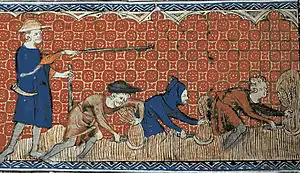Lord paramount
Paramount (derived from the Anglo-French word paramont, which means 'up above', or par a mont, meaning 'up or on top of the mountain') is the highest authority, or that being of the greatest importance. The word was first used as a term of feudal law, of the overlord, the lord paramount, who held his fief from no superior lord, and was thus opposed to a mesne lord, one who held fief from a superior.[1] Those who held their fiefs from one who was not a lord paramount were given the correlative term "paravail", (from par aval, meaning 'in the valley'). The word was confused by English lawyers with "avail," help, assistance, profit, and applied to the actual working tenant of the land, the lowest tenant or occupier.[2]
A well-documented example of paramountcy is the Lordship of Bowland. In 1311, it was subsumed as part of the Honour of Clitheroe into the Earldom of Lancaster. After 1351, it was administered as part of the Duchy of Lancaster, with the Duke of Lancaster (from 1399, the sovereign) acknowledged as lord paramount over the Forest of Bowland and the ten manors of the Liberty of Bowland. As lord paramount, he was styled Lord King of Bowland.[3]
The Marquess of Exeter is the hereditary Lord Paramount of Peterborough.
The term lord paramount has been invoked in other common law jurisdictions, including New York (1852).[4] In 1992 the position of Queen Elizabeth II as lord paramount in respect of the system of land tenure in Australia was affirmed and explained by the High Court of Australia ruling in the Mabo v Queensland (No 2) case.[5][6]
See also
Notes
- "Paramount is a word used in our law, signifying the highest lord of the fee, of lands, tenements or hereditaments" in The Common Law Common-Placed, by Giles Jacob 1726. p.351
- Sir William Searle. "An historical introduction to the land law page 105 to 107". Google Books Preview.
- Cambridge History of the Lordship of Bowland Archived 2011-07-11 at the Wayback Machine
- De Peyster v. Michael, 6,NY 467; quoted in 28 Am. Jur 2nd Estates, §§ 3 and 4
- Mabo v Queensland (No 2) [1992] HCA 23, (1992) 175 CLR 1 per Brennan J para.51.
- Davison, Graeme; Hirst, John; Macintyre, Stuart (1998). The Oxford Companion to Australian History. Melbourne: Oxford University Press. ISBN 0-19-553597-9., pp. 5–7, 402.
References
 This article incorporates text from a publication now in the public domain: Chisholm, Hugh, ed. (1911). "Paramount". Encyclopædia Britannica. 20 (11th ed.). Cambridge University Press. p. 766.
This article incorporates text from a publication now in the public domain: Chisholm, Hugh, ed. (1911). "Paramount". Encyclopædia Britannica. 20 (11th ed.). Cambridge University Press. p. 766.
